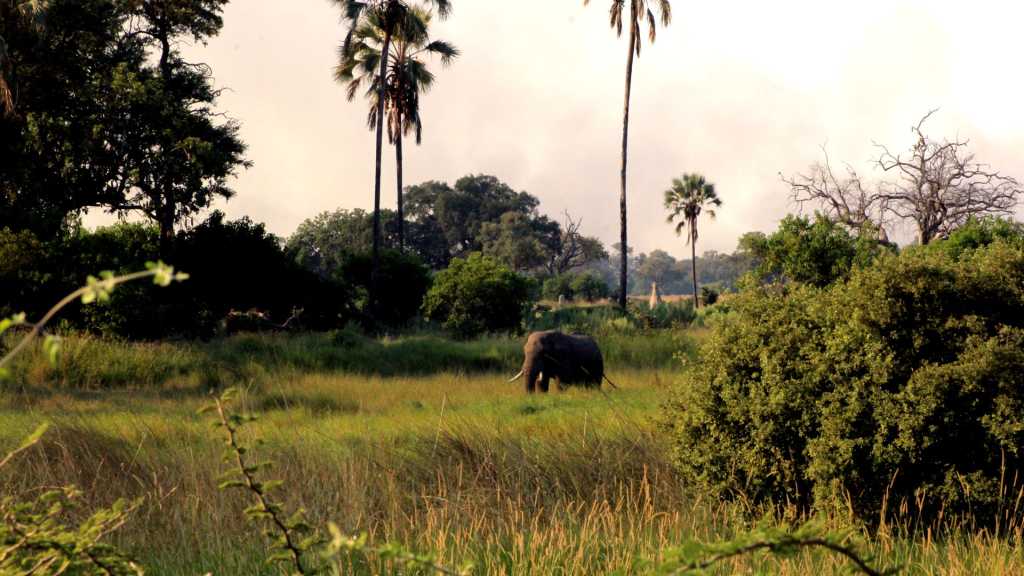Located in the eastern part of the Okavango Delta, the Moremi Reserve is the first Southern African reserve to have been created by an African community on its own territory. At the beginning of the sixties, a great realisation took place of the inevitable and dramatic reduction of the game in the territories traditionally used for hunting. Faced with the rapid degradation of natural resources, Mrs. Moremi, then official representative of the tribe since the death of her husband, decided to convert 1800 km2 of tribal territory into a protected area. Thus, in 1963, the "Moremi Reserve" is born,whose name pays homage to a generation of powerful leaders.
Nowadays, the Moremi whose territory extends over nearly 4,000 km2, is one of the most famous and attractive reserves of Southern Africa because of the exceptional abundance of its fauna, due in particular to the extreme diversity of its habitats.
The Moremi combines, in a relatively small space, a real mosaic of landscapes: swamps, lagoons and floodplains properto the Delta itself, acacia forests and mopanes more characteristic of arid zones. There are many species of birds: hoopoes, francolins, common guinea fowl, bucorves, rollers, eagles, vultures, beards, hornbills, shrikes, ducks, waders, geese, bee-eaters, kingfishers, cormorants, herons, ibis,Senegal jabirus, marabouts, egrets, pelicans, flamingos... The Moremi is also Botswana's best reserve with the Chobe for the diversity and abundance of mammals that evolve on its territory: herds of elephants, zebras, blue wildebeest, buffaloes, antelopes, lions, leopards, cheetahs,spotted hyenas, wild dogs, servals, jackals...
The Okavango, 1300 km long, has its source in central Angola and joins the Botswana desert crossing the Namibia by Caprivi Strip. It is often described as the ‘’river that never meets the sea" because it is lost in a vast labyrinth of lagoons, canals and islets extending over more than 15,000 km2.
On entering Botswana, it is the third largest river in Southern Africa. But while continuing his race, he meets the sands of the Kalahari which retain a good part of its water. The Okavango then evaporates mysteriously to form a huge inner delta...
- Lucky you! The Okavango Delta can be visited all year round. The landscapes change colour according to the seasons but remain incredibly beautiful and the animals flock there in the dry season as in the rainy season ... the intermediate months of April and November allow all activities most of the time ...
- Even if your budget allows you to spend only a few days, do not miss a visit in the heart or on the edge of the Delta ... it's unique!
- Try the Mokoro and adopt it! Let yourself be guided gently and follow the corridors drawn by the hippos ...
- Experience the "Fly Safari" on a light plane over the sumptuous landscapes of the Delta and sharpen your eye looking for animals from the sky!
Botswana, the Greatest Wildlife
Botswana's National Parks are, without doubt, the wildest in Africa. Tourism is intentionally limited to preserve pristine nature. If you can afford authentic Africa, head for Botswana, one of the last wild sanctuaries on the continent, distinguished by an abundance of exceptionally rich wildlife. A trip to Botswana almost inevitably involves a visit to Victoria Falls in Zimbabwean territory due to their strategic position: take a step at the end of your safari, their grandiose appearance will amaze you.
When to go?
The dry season lasts from April to October to the south and November to the north where, however, the rain totals are higher. The southern part of the country is most exposed to cold winds during the winter period (early May to late August) when the average temperature is about 14 ° C (57.2 ° F). The whole country has hot summers with average temperatures around 26 ° C (78.8 ° F). Temperatures are high throughout the year although winter is the sunniest period. The whole country is windy and dusty during the dry season.
Formalities
The visa is not compulsory for French nationals. The passport must be valid for at least six months after entry into Botswana. The permitted length of stay is in the sole discretion of the Immigration officer, it is recommended to check the date on the stamp when entering the country.
Anyone traveling to Botswana with a minor child must be able to provide a complete and certified copy of the child's birth certificate or a plurilingual birth certificate in addition to his or her valid passport. If the child is traveling with only one of his parents, he will have to present a travel authorization signed by the absent parent.
Health
No vaccination is mandatory but some vaccinations are recommended; Yellow fever vaccination is mandatory for all travellers from a country where endemic yellow fever is present but may be advised to all travellers.
Antimalarial treatment is recommended (see your doctor).
Currency
The Pula (which in Tswana means "rain") is the official currency of Botswana.
Major credit cards are accepted in most of lodges but it is imperative to possess US dollars in sufficient quantity to regulate the extras (drinks, tips...)
